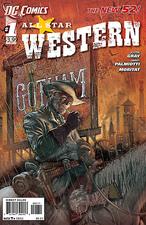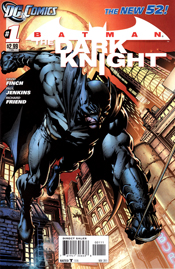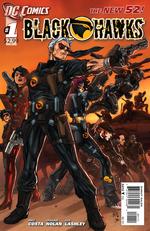This was the final pile of new DC books I read. The pile included All-Star Western, Aquaman, Batman: The Dark Knight, Blackhawks, The Flash, and The Fury of Firestorm. This was a very strong group of books in comparison to the other books released in the final week. There were some weaker books, but overall each of the books hold an argument for continuing to read them. Also, I had not previously read any of these books on a monthly basis. From what I read, at least three of these books will be picked up again in the future: All-Star Western, Aquaman, & The Flash.
All-Star Western: This is a fun book to read! It is a wonderful break from the rest of the super-hero laden comics that DC churns out. Here we have the story of Jonah Hex, a mysterious bounty hunter of the late 1880's. Hex comes to Gotham city where he finds himself caught up in a Jack-the-Ripper style murder mystery. The story is great with wonderful nods to places and names that crop up in the modern Batman books, making you wonder if what happens in this book could affect the modern books. The art is by Jimmy Palmiotti, who is an artist I have loved for a very long time. This past summer at the Calgary Fan Expo, Palmiotti was in attendance and made the announcement that he would be joining the creative team on this book. His art is masterful here and shows how much his talent has grown over the decades. Highly recomend this book!
Aquaman: Doesn't Aquaman talk to the fish or something? This and other questions are all bluntly answered in this well crafted and highly entertaining first book!
Honestly, I have never been a fan of Aquaman. He's the but of most geek'ish jokes. Geoff Johns, the writer of this book presents a a character who is re-examining his past, left his previous role of King of Atlantis, and is trying awkwardly to fit in to life on dry land. The story also has a slight edge to it that feels as though this is how Quentin Tarantino would interpret the character provided he had to work within a PG-13 framework.
Johns' story does not explain the origin of Aquaman but instead plops the reader in the middle of this character's story where a new chapter in his life is being explored. This strategy has been found in a number of the new DC comics such as Swamp Thing and Hawkman, and as in the case here can be a great tool to satisfy older and newer readers by not discrediting the past while offering a clean slate for the new reader. In all, I really enjoyed this take on Aquaman and am very interested in where this character will be taken next.
Batman, The Dark Knight: Another Batman book is included in the New DC lineup. Thus far there have been Batman, Batman & Robin, Detective Comics, and the plethora of Batman spin-off titles like Batgirl. The high number of Bat books is rationalized if each of the comics focused on one aspect of Batman. In such a case Batman & Robin would be the relationship between the two, Detective Comics would focus on Batman solving crimes, and Batman would be a holistic book focusing on Bruce Wayne, alter ego of Batman, and interactions with secondary characters like Robin. However, what is The Dark Knight supposed to be about then? It would seem that this book focuses more on the private life of Bruce Wayne as the first issue explores a party that Bruce holds where a member of the police department says he is being investigated for financially supporting the Batman. If this book is to focus on Bruce Wayne, then I am left wondering if this is something I have ever wanted to read about or will this provide me an interesting angle on the complex world of Batman?
Overall, the story isn't bad but I do not find that it adds anything to the other Batman books and instead this book will get forgotten about. Even if the book is to focus on Bruce Wayne, I am unconvinced there is a need for such an ongoing book; instead, this might work better as a mini-series. The writing and art is provided by David Finch, who might be better than Tony Daniels who draws & writes for the Detective series. I recomend this book but would not doubt this book being canceled within the year because of its redundancy with the other Bat books, even if it is done well.
Black Hawks: This is not a bad book, but it makes very little sense in how it figures into the overall DC Universe. A team of UN sanctioned covert military agents are focused upon here where they combat various threats. In the first story we see the group stop terrorists (I guess that's what they are), a UN representative informs the Black Hawks that their cover has been compromised, and that one of their agents has been infected by something. Not a bad introductory plot, but without an explanation of how this fits into the realm of other superhero books I was left wondering what the point of Black Hawks will be. Is this book to be an isolated group of characters or will their actions have repercussions (and vice versa) in other DC books? Black Hawks #1 is worth reading, and I am tempted to read the next few issues to see where this book is headed. However, if the creators of the book do not explain the role /importance of this book soon I will also quickly loose interest.
The Flash: The releasing of the Flash during the final week of the New DC run was a misstep. The Flash was the central figure during the Flashpoint series that led to the re-numbering of the DC comics. As he was such a pivotal figure, one would guess the title Flash book would be massively promoted and included in the first week of books. This book, one would again assume, would be used to explain how things did and did not change in the DC Universe as the Flash was the reason why these changes had begun at all. Additionally, one might assume that the Flash would be one of the few characters to remember what the universe had been like and to recall what he had previously done. Instead, the first issue of the Flash provides none of this and leaves the long-time reader wondering how the previous Flashpoint and Flash books figure into the new Flash series.
Leaving the problems above aside, Flash #1 is a stupendous comic. It is loads of fun and features some of the best art in the DC Universe. Manapul utilizes grey washes over top a cartoony /anime style that works really well here; also reminds me of Tim Sale's work. The dialogue is also crisp and the pacing of the comic works very well, leaving a lot of story for developing characters but never making you feel bogged down with too much exposition. This is one of the best books DC has produced and should /will become one of their most popular books!
The Fury of Firestorm, The Nuclear Men: This is hands down the worst illustrated book out of the bunch. Yildiray Cinar's art is horribly stilted and filled with poor anatomy. The faces feature two expressions: nothing or angry. The story was also generic and poorly structured with a secret group of assassins chasing after a mysterious product of a science experiment. The reader is taken on a voyage across the globe as this group brutally murders anyone associated with the experiment as they track down whatever it is they are looking for. Eventually their chase leads them to a high school in the United States where two teenage boys have the product and use it and become Firestorm. This is a very generic story that has been used for the retelling of too many other super-heroes. What makes the story worse is that it took TWO writers to come up with this: Gail Simone & Ethan van Sciver. I'm not familiar with Sciver, but Simone has produced much better stuff and recently gave us the pretty decent Batgirl comic. I don't know what happened here between these three creative persons, but I have no interest in seeing where this book goes.






No comments:
Post a Comment